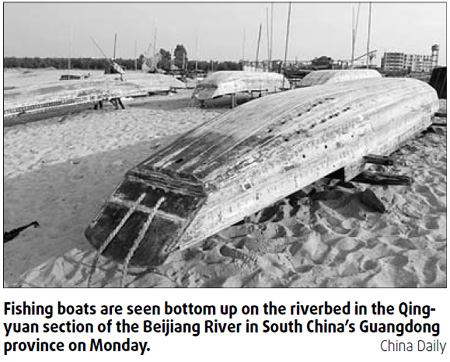Guangdong drought hard to swallow
 |
Months of unending severe drought has Guangdong province reeling - causing stunted crops, shrinking reservoirs and leaving thousands of people short of drinking water.
The drought followed 14 percent less rainfall in the first 10 months of the year, the provincial government reported.
The dry conditions have shriveled up more than 55,000 hectares of farmland.
The reduced rainfall has put more pressure on Guangdong's 32 major reservoirs. They now hold 2.3 billion cu m less than they usually do, according to the provincial flood control and drought relief headquarters.
Eight cities - including Meizhou, Shaoguan, Qingyuan, Shantou and Chaozhou - have been affected by the extreme weather conditions.
"I have not seen such a severe drought in the last two decades," said a 73-year-old farmer from Renhua county in Shaoguan in the northern part of Guangdong.
"A great many crops in the village have been damaged," he told Nanfang Daily.
The farmer said there may be more damage in the pipeline because the drought will have diminished crops' ability to survive the winter.
The drought has left at least 55,000 people short of drinking water.
The hardest hit part of the province is Nan'ao, an island county within Shantou, in eastern Guangdong. There, the drought has left more than 42,000 people short of drinking water, according to the local flood control and drought relief office.
"People on the island have been supplied with drinking water every seven days since the National Day holidays," said an official surnamed Chen who works with the Shantou flood control and drought relief office.
The island currently has a store of 400,000 cu m of water, which should be enough to last until the middle of November.
Despite the fact that Guangdong has been hard hit by the drought, water from the province has continued to flow into neighboring Hong Kong and Macao, according to the provincial flood control and drought relief headquarters.
Each day, Guangdong sends 2 million cu m to Hong Kong and 230,000 cu m to Macao.
The provincial government is trying to mitigate its vulnerability to drought and has earmarked more than 100 million yuan ($14.7 million) for improving water infrastructure.
 0
0 






